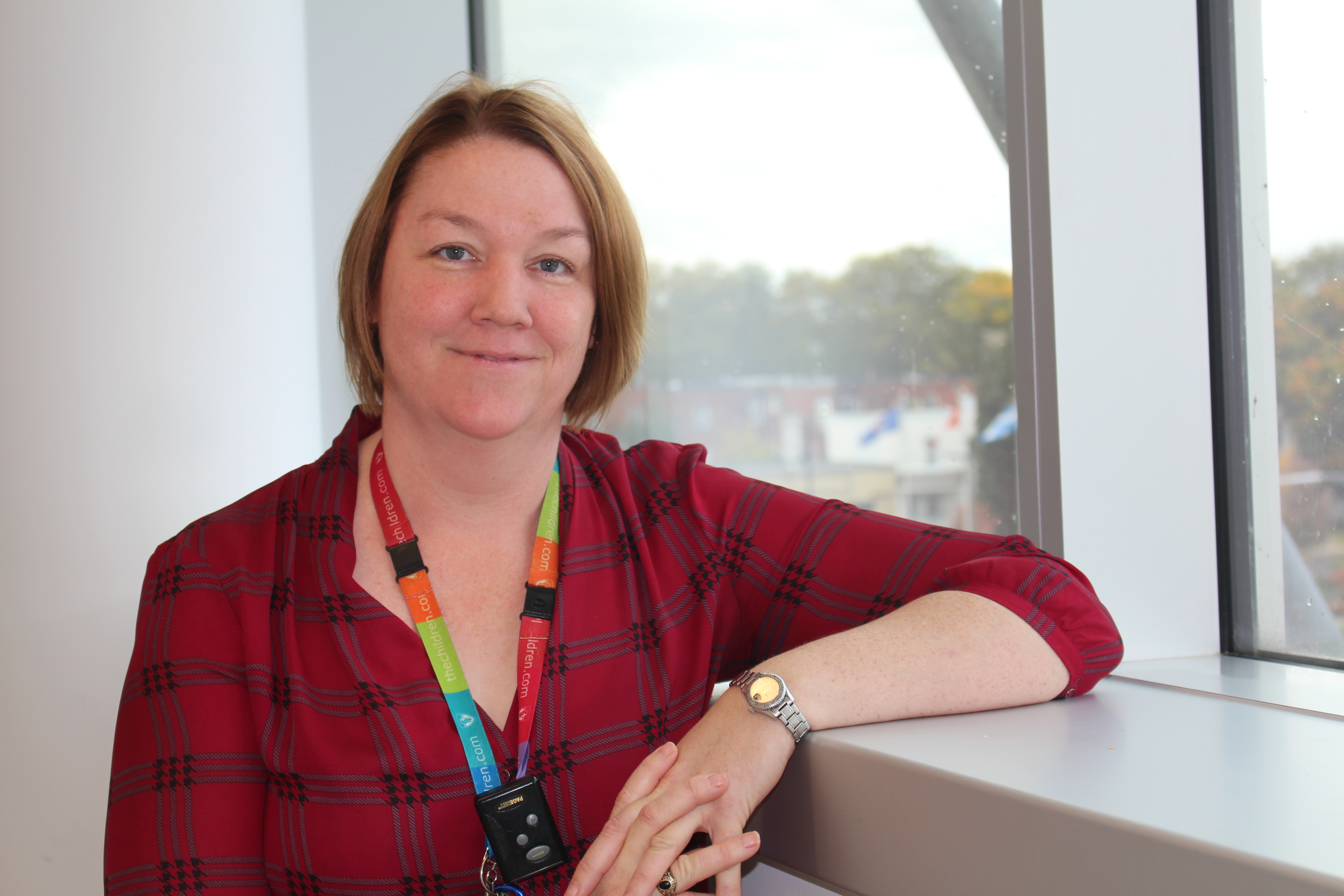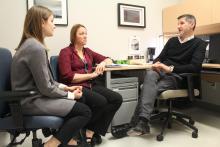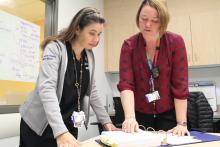A day in the life of an ethicist

As a respiratory therapist, Lori Seller was often confronted with ethical issues. “I worked primarily in the intensive care units, which tend to be very stressful, emotional environments,” she says. “And I started to questions things; not about the care we were delivering, but about why we did or said the things we did.” This curiosity led to Lori returning to school to complete an undergraduate degree in philosophy, followed by a Master’s degree in Bioethics at McGill University, thus propelling her down a whole new career path: ethics.
Ethicists bring to the table special training in moral theories and critical analysis, as well as knowledge of well-established principles of medical ethics, local health law, patient’s rights, clinicians’ professional obligations and hospital policy. “It is actually quite rare for an ethical dilemma for which I am consulted, to be the first time anyone has confronted that issue. Our knowledge of these different considerations and our ability to recognize and navigate their interplay is part of the ethicist’s expertise,” she says.
Lori explains that ethics goes beyond just following simple rules like “respect confidentiality”. “The approach we use here is casuistic which means case-based reasoning. It involves thinking about how we usually do things, and how and why particular aspects of a given case might ethically justify the need to do things differently.” In general, Lori is called upon to help name the ethical problem, provide an ethics analysis and recommend a principled resolution.
Lori’s work is divided into three categories: clinical ethics, research ethics and teaching. She is part of the McGill University Health Centre’s (MUHC) Centre for Applied Ethics and is the only ethics counselor assigned to the Montreal Children’s Hospital. As an ethicist, her primary goal is to try and balance competing interests and values. “As an ethicist, I wear different hats. I’m part analyst, interventionist and mediator,” says Lori. “It’s important to remember that we all have our own ‘moral compass‘. Sometimes our different values don’t align and sometimes we weigh the importance of things differently. That can lead to conflicts.”
Clinical ethics
About once a month, Lori will be asked to consult on a clinical ethical dilemma, most often in the intensive care units or hematology-oncology unit. “These areas deal with a lot of stress, as well as end-of-life decisions,” she says. “I help bridge the gap between families and the clinical team when competing values are in play.” In these situations, Lori will sit with the care team to gain insight, and learn more about the dilemma in question.
A dilemma either signifies two competing goods, both of which you would like to achieve, or two competing harms, both of which you would like to avoid. An example might be a case in which everyone feels there is a choice to be made between prolonging life versus prioritizing comfort. “Sometimes what it takes to achieve one goes hand in hand with undermining the other; achieving both perfectly is just not possible, although both are things we strive for in medicine,” she says. In these cases, both families and clinicians can feel quite a bit of moral distress. Everyone feels like they are not doing everything they should.
Lori’s main goal when meeting with families is to better understand their point of view and ensure there is at least a shared understanding of some of the facts. She also uses this opportunity to explore the family’s understanding of the medical team’s perspective and point out any discrepancies or assumptions that she uncovers so they can be discussed. “As a neutral third party, my intervention is usually well-received by the family. I make it clear that my role is not to pressure them into agreeing with the clinical team,” she explains. “I’m called in to unblock an impasse and to help move everyone forward. At the end of the day, I make recommendations to the team, but nothing is binding. Clinicians and the patient’s family are responsible for all final decisions.”
At other times, clinical teams will ask Lori to provide some guidance about how to best meet their professional ethical obligations. For example, questions like: what is an appropriate level of disclosure in this context, or am I obligated to offer interventions that exist but that I do not recommend in this circumstance? In these cases, Lori works solely with the clinical team and will not necessarily meet with the family. “I’m often called when there is uncertainty about the ‘right’ or ‘least wrong’ thing to do or about what ‘should’ be done in a particular context. Sometimes I can be offered as a resource to families, a neutral third party who can help them to articulate their values and promote shared decision making. Other times, the clinical team just wants to work through the options and discuss their professional obligations.”
Research ethics
As co-chair of the MUHC’s Research Ethics Board (REB), Lori spends the majority of her time reviewing and validating research trial proposals. “Any research involving humans needs to be reviewed and approved by an ethics committee,” she explains. Every year, the MUHC reviews about 800 new research studies, 150 of those in pediatrics. When reviewing these types of research projects, the committee asks two significant questions: is this ethical and is this scientifically valuable?
The board – made up of professionals with wide ranging expertise in science, ethics, law, as well as a family partner - reviews the study, the language used in the consent form and ensures that regulatory requirements are met. Ultimately, the REB’s mandate is to ensure the rights, well being and safety of participants. When dealing with children, there are additional protections in place as they may have difficulty understanding how research is different from clinical care and weighing the risks and benefits of participation. Studies cannot begin until they are reviewed and approved by the REB.
“These research trials are so important when it comes to advancing medicine,” she says. “I’m continuously amazed by how innovative the MUHC and its Research Institute is. We see a lot of studies and research ideas created by our very own physicians. Clinicians in this institution are always looking for and finding new and better ways to treat their patients. It’s very inspiring to witness. I always joke that we are lucky these people are using their brains for good instead of evil!”
Teaching
Another important part of Lori’s job is education. She teaches ethics to medical students and residents, as well as nurses and allied health professionals. She also gets involved in case debriefings, where she sits down with a clinical team after the fact to review a situation that caused moral or ethical strife. “Sometimes these situations occur because the team has not reached a consensus and ends up sending mixed messages to the family. It’s important to figure out what the real medical options are and to present those in a consistent way when it comes to these difficult decisions,” says Lori. “And I’m happy when I get to play a little part in that.”
Lori is also invited to attend psycho-social rounds in several departments. “This gives the team a chance to recognize potential ethical issues that might come up and to discuss them with me so we can work to prevent the situation from escalating or becoming a full-fledged dilemma. I also think that those who see me as a member of their team are more comfortable reaching out to me to discuss ethical issues when they come up.”




